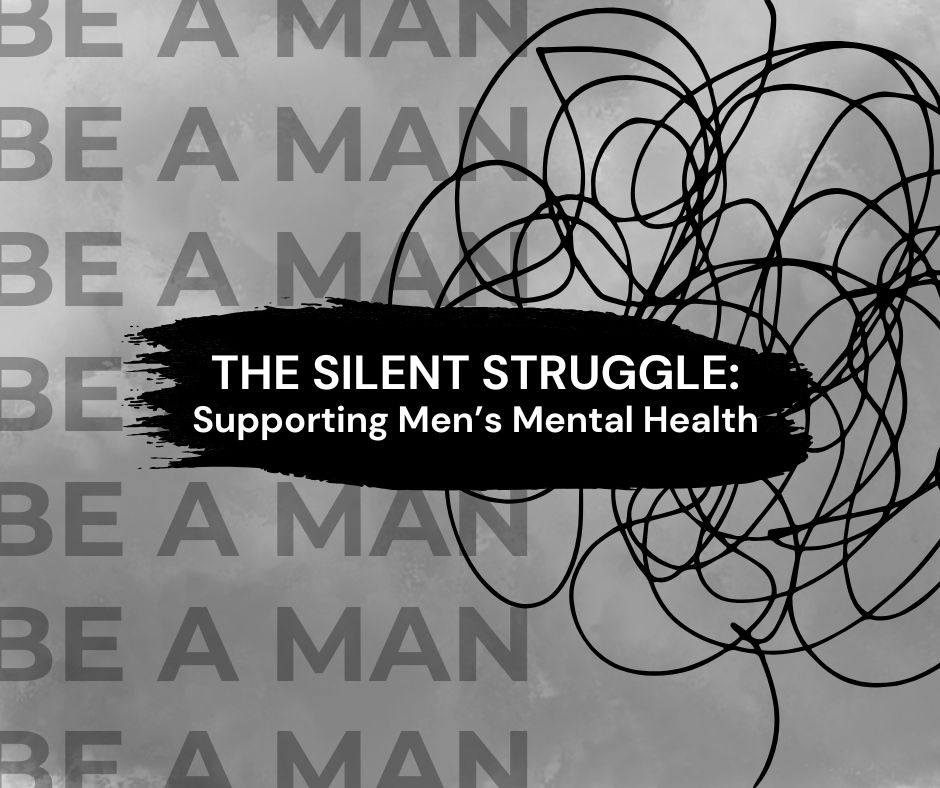Mental health has become an increasingly important topic in recent years, yet stigma and societal expectations still create barriers to open discussions.
These types of issues can affect anyone, regardless of gender, but men often face unique challenges that can complicate their experiences. Societal norms often pressure men to maintain a façade of strength and stoicism, leading to reluctance to seek help. This article aims to provide practical strategies for supporting the men in your life who may be struggling with these types of challenges.

Recognising the signs
The first step in supporting men with mental health issues is recognising the signs. Men often exhibit different symptoms than women, which can lead to misunderstandings. Look for:
- Changes in behaviour: Withdrawal from social activities, increased irritability, or sudden mood swings can indicate underlying issues.
- Physical symptoms: Men may express their distress through physical complaints, such as headaches, fatigue, or changes in appetite.
- Substance abuse: Increased reliance on alcohol or drugs may be a coping mechanism for underlying emotional pain.
- Difficulty expressing emotions: Many men were socialised to suppress their feelings, making it hard for them to articulate what they are going through.
Being aware of these signs can help you approach the situation with sensitivity and understanding.
Creating a safe space for communication
Encouraging open dialogue about mental health can be daunting, but it is essential. Here are some tips for creating a supportive environment:
- Be approachable: Let the men in your life know that you are there to listen without judgement. A simple ‘I’m here if you want to talk’ can open the door to deeper conversations.
- Practice active listening: When they do share, listen actively. Avoid interrupting or offering unsolicited advice. Sometimes, just being heard can be incredibly healing.
- Normalise vulnerability: Share your own feelings and struggles to demonstrate that it is okay to be vulnerable. This can help them feel more comfortable sharing their own experiences.
Educating yourself and others
Understanding mental health is crucial in providing effective support. Educate yourself about common mental health issues, such as depression, anxiety, and stress. Familiarise yourself with:
- Myths and facts: Dispel common myths that suggest men should be strong and stoic. Recognise that vulnerability is a strength, not a weakness.
- Available resources: Know what resources are available, such as therapy, support groups, or hotlines. Being informed allows you to provide practical help.
Share this knowledge with others in your social circle to encourage a more understanding community.

Encouraging professional help
While your support is invaluable, it is essential to recognise when professional help is needed. Encourage the men in your life to seek therapy or counselling if they are struggling. Here is how you might approach the conversation:
- Be supportive: Frame the suggestion positively. For instance, ‘Talking to someone can really help; many find it beneficial’
- Provide support: Offer to help them to find a therapist or accompany them to the first appointment if they are nervous.
- Be patient: Understand they may be resistant at first. Change takes time, and it is important to be supportive without pushing too hard.
Adopting healthy habits
Encourage healthy habits that can positively impact mental health through:
- Physical activity: Regular exercise can significantly boost mood and overall wellbeing. Invite to join you for walks, workouts, or sport.
- Mindfulness practices: Introduce them to mindfulness, meditation, or breathing exercises. These practices can help manage stress and promote emotional regulation.
- Healthy relationships: Encourage them to nurture friendships and social connections, which can be crucial for mental wellbeing.
Being there in tough times
Sometimes, just being present is enough. Whether it is sending a text, checking in, inviting them out, or simply spending time together, small gestures can make all the difference.

Supporting the men in your life with mental health issues requires compassion, understanding, and a willingness to engage in difficult conversations. By recognising signs, promoting open communication, encouraging professional help, and promoting healthy habits, you can play a pivotal role in their mental health journey. Remember, it is not about fixing the problem but being a reliable source of support as they navigate their challenges.
If you are looking to deepen your understanding of mental health and enhance your ability to support others, enrol in our online exclusive, industry-recognised Caring for Mental Health course, which offers essential insights and skills. Call our office on (08) 8340 6875, send us an email info@kcskillscentre.com.au, or visit our website.
If you, or someone you know, is struggling with their mental health and needs immediate support, please contact the Mental Health Triage Service on 13 14 65 who operate 24 hours a day, 7 days a week.


